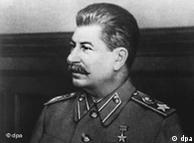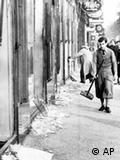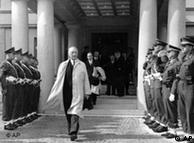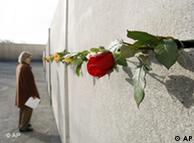EUROPE | 28.12.2008
2009 a Year of Anniversaries in Europe
Other than the 70th anniversary of the start of the Second World War, which began when Hitler's troops marched into Poland on Sept. 1, 1939, next year also marks the 20th anniversary of the fall of communism across central Europe.
Starting with democratic elections in Poland in June 1989, the year of change across central Europe culminated in November of that year with the fall of the Berlin Wall. That event became a symbol of the end of the Cold War and Europe's post-war divide.
The breaching of the Berlin Wall also led to the unseating of the Soviet-backed government in Prague and the ousting of Romanian president Nicolae Ceausescu a few weeks later. On Christmas Day, Ceausescu and his wife were executed by firing squad following a bloody revolution in the country to unseat the hated dictator.
A new study released this month said, however, that Germans living in the country's former communist East felt they were second-class citizens in the reunified Germany that emerged following the fall of the wall.
Undertaken by the University of Bielefeld, the study revealed lingering resentment in the East about life since a popular uprising in late 1989 paved the way for the collapse of East Germany's Stalinist government.
Shift to the West
 Stalinist regimes were toppled after the collapse of the Berlin Wall
Stalinist regimes were toppled after the collapse of the Berlin Wall
Decades later both eastern and western Europe are still grappling with the events surrounding World War Two and the fall of communism, as well as struggling to forge a new identity in a world now shaped by fast-paced globalization.
"The common past is a chance for the future," Polish Foreign Minister Radoslav Sikorski said in a speech delivered in Berlin this month. "The events followed a decades-long struggle by those who refused to abandon their freedom," Sikorski said.
Triggered by former Soviet leader Mikhail Gorbachev's drive for glasnost -- openness -- and perestroika -- economic change -- the fall of communism across central Europe in 1989 also ultimately helped loosen communist grip on Moscow and pave the way a few years later for the collapse of Soviet Russia.
Nearly 20 years after the communist governments of central Europe fell like dominoes, the region's new political leadership is still trying to sweep away the industrial and social debris left by decades of command economics. This transformation has been signified by a strong shift towards western-style economic systems.
However, this process is now likely to be made more complicated by the economic downturn rapidly taking hold around the world.
Specter of the Nazi state
 Kristallnacht saw Nazi thugs set fire to synagogues and loot Jewish businesses
Kristallnacht saw Nazi thugs set fire to synagogues and loot Jewish businesses
November 9 rears itself as a strangely recurring date in German history.
This date marks Hitler's stepped-up reign of terror against Jews onKristallnacht -- The Night of the Broken Glass -- and the failure of his Beer Hall Putsch in Bavaria in 1923. Kaiser Wilhem II also abdicated on Nov. 9, 1918.
But, in a sense, all these strands of history lead back to a September day nearly 70 years ago when Nazi troops crossed the border into Poland, sparking six years of war and unleashing the barbarity of the Third Reich on Eastern Europe.
It is a measure of the ongoing fascination with the horrors of Nazism that there seems little end to the book and movie industry that has grown up around it.
British historian Richard Evans has just published The Third Reich at War, the final instalment in his trilogy of books on Nazi Germany.
New York-born director Bryan Singer's "Valkyrie," a film about the 1944 plot to assassinate Hitler starring Hollywood actor Tom Cruise, came out in the US at Christmas and will open in Germany in January.
BRD, Euro celebrated
 Konrad Adenauer was the first chancellor of the Federal Republic of Germany
Konrad Adenauer was the first chancellor of the Federal Republic of Germany
Other commemorations to take place in Europe in 2009 include the ceremonies surrounding the 60th anniversaries of the creation of the Federal Republic of Germany (BRD) and the formation of the US-led NATO security alliance.
Next year will also mark the 10th birthday of the euro, which became the accounting currency of 12 European states on Jan. 1, 1999. Euro coins and banknotes were issued three years later on Jan. 1, 2002.
Comments